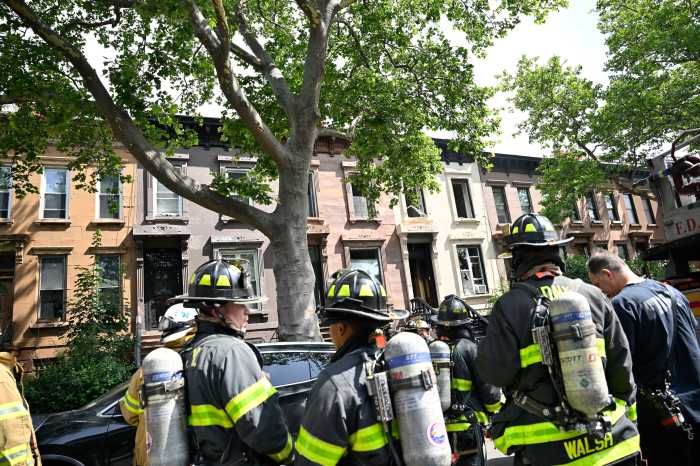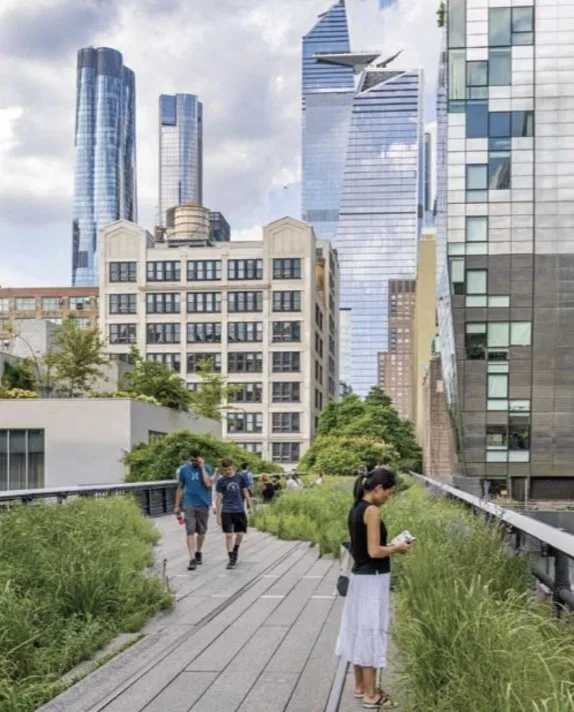While the Brooklyn College administration may believe that their plan for a relocated community garden will smooth ruffled feathers, the announcement by the school of its intention of creating a new, considerably smaller garden under greater college control appears to have stoked the ire of the gardeners who cultivated the old garden, and who feel they are being pushed out by the powers-that-be.
The college released its plan for the garden earlier this month, a couple of weeks prior to a scheduled meeting between college reps and the gardeners at the office of Community Board 14.
The new garden, which will be relocated so a parking lot can be built at the western end of the athletic field, will be 2,500 square feet, far smaller than the 6,500 square foot the garden had grown to.
The garden will be fenced in, to control future sprawl, and will contain a pump, providing a water source that the gardeners had long wished for. In addition, there a faculty coordinator will be appointed to “oversee the management of the garden for use by community members,” according to a college press release, which also notes that the garden will “serve as the basis for a broad spectrum of academic and sustainability initiatives for faculty and students.
“Members of the surrounding community,” the press release goes on to say, “will also be welcome to plant on individual plots, which will be assigned to them on a yearly base.”
“The Brooklyn College garden is an exciting part of our academic mission,” noted William Tramontano, the school’s provost in a statement.
“A working garden on college grounds will provide our faculty and students with the opportunity to explore such important issues as health, nutrition, organic farming and sustainability practices,” he went on. “At the same time, the garden will underscore one of our most important tasks– to create educational opportunities for the public and extend ourselves as good neighbors to the surrounding community.”
But, said Toby Sanchez, an area resident who heads up the community garden, the gardeners feel that the college, “Has kind of pushed us out of it. The community members will be the last ones to get spots. I don’t think they want us there.”
In a letter to BC President Karen Gould, Sanchez contended that a letter sent earlier this month to the gardeners by Nicole Hosten, BC’s director of college and community relations, “was much less inviting” than the information posted on the college’s website.
“Gardeners will be assigned a planting bed spot, as available, by the coordinator with the understanding that request by faculty, staff, and students will be honored first,” Sanchez wrote, adding, “Community gardeners have worked this land for over a decade, investing their heart and thousands of hours of their time, creating a valuable asset for the college, the community, flora and fauna and the environment.”
Given that, “the community gardeners provide a more permanent source of energy and laborthat have and will maintain the garden for the long haul including the long summer college break,” Sanchez asked that the college, “set aside adequately sized plots for the current community gardeners and College Now program and reserve a set number of plots for the community/ College Now in perpetuity,” as well as increase the size of the garden to between 3,500 and 4,000 square feet.
The college had never intended the garden to get so large, recalled Florence Valentino, a South Midwood resident and co-chair of CB 14’s Education, Libraries and Cultural Affairs Committee, stressing that there were “two sides” to the issue.
Rather, she said, the college had loaned a 2,500 square foot area to South Midwood Residents Association (SMRA) gardeners, drawing up a contract with SMRA that outlined specific rules, after local gardeners lost the space they had cultivated to development.
“The college was gracious,” Valentino said, “but they said it was a temporary measure till the college needed to reclaim the space.”
Subsequently, she went on, rather than being limited to South Midwood residents, the garden was opened up to people from farther afield, who, “got control. None of what was in the original contract seemed to be going forward.”
Not only did the garden sprawl beyond its original limits, Valentino said, but the gardeners composted food, even though that was prohibited in the contract, and planted trees, even though that was not supposed to occur. “Promises were made and promises were broken,” she remarked.
“To the college’s credit,” Valentino went on, “they decided to sort of take it back but allow the community to have space but on a limited scale. They are going to define the garden more specifically and a faculty member will be in charge of the garden in terms of the students and curriculum at the college.
“I think it will work out,” she concluded. “Maybe a year from now, everyone will settle in and go forward, and it won’t be such a terrible thing.”





















